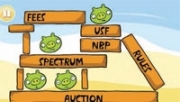Angry birds and Lady Gaga

Obama's FCC continues its hell-bent drive to remake the entire telecommunications infrastructure. This, despite multiple court rulings and congressional warnings to cease and desist. Add to this the chairman's wanton profundity to mislead America with his selective use of facts and data. Combined, we have a mash-up of the Angry Birds game and Lady Gaga.
On Feb. 7, FCC Chairman Julius Genachowski spoke to the Information Technology and Innovation Foundation (ITIF), where he again ranted about America's low ranking in broadband adoption. According to Genachowski, the United States is last among major nations in broadband adoption. His speech was just another attempt to bolster his case to force broadcasters off the air.
Let's examine our chairman's house of (dis)honesty.
Genachowski often selectively picks data from this year's FCC 706 Report to Congress and his National Broadband Plan in his speeches. Let's examine some of the so-called “facts” the chairman often quotes.
First, as any bureaucrat knows, if the facts don't support your case, just change definitions. In a blatant effort to portray the low rate of broadband adoption, the FCC changed key measurement definitions between the 2009 and 2010 reports. For instance, the definition of “broadband” in the 2009 report was a wired or wireless link with a speed above 200kb/s.
In order to strengthen the agency's broadband case, beginning with the 2010 report, the FCC redefined broadband to be a wired 4Mb/s or higher service. And, wireless links were no longer counted. Any of you with 3G or 4G connectivity, by FCC definition, do not have broadband.
Under the previous 706 Report definitions, a 3Mb/s wireless link was classified broadband. Under those definitions, the United States was not last, rather 12th, worldwide in broadband adoption. Yet, the FCC simply changed key definitions, and America suddenly drops to 40th (last) on the same list in one year. Dishonesty.
The professional video industry's #1 source for news, trends and product and tech information. Sign up below.
Genachowski also obfuscates the truth in other ways by saying that the United Sates is “last” when compared to other countries. However, the score he mentions represents a composite measurement across multiple survey points and over time, most of which have nothing to do with broadband adoptions!
In fact, the ITIF concluded from the same data that the United States leads Europe in 13 of the 16 indicators, including knowledge (higher education and number of researchers); innovation (corporate and government R&D and scientific publications); information technology (IT investments, e-government and broadband); overall business climate; entrepreneurship (new firms and venture capital); and productivity.
Second, the chairman cleverly ignores data from his own study when it doesn't support the points he's trying to score. America's broadband adoption rate isn't “low” because of a lack of availability; it's because some Americans either don't want broadband or don't have a computer that requires it.
Further chairman fuzzy math … When Genachowski says that “24 million Americans” don't have broadband, that means individuals. However, broadband (like TV) usage should be measured across “households,” not “per-capita.” We don't measure TV set penetration by persons, but by household. Broadband should likewise be measured.
Finally, the ITIF report notes that the FCC's own documentation shows that U.S. broadband implementation is growing 30 percent faster than ever before. But our chairman ignores that truth.
Genachowski's latest the-sky-is-falling speech is little more than a mash-up of the Angry Birds game and Lady Gaga. His speeches may sound good, but they are full of holes and short on truth.
Send comments to: editor@broadcastengineering.com
